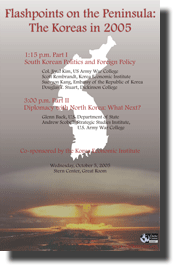Wednesday, October 5, 2005
Flashpoints on the Peninsula : The Koreas in 2005
Stern Center, Great Room, 1:15 p.m. and 3:00 p.m.

Issue in Context
On Tuesday, September 13, 2005, the two Korean nations, in conjunction with the United States, China, Japan and Russia, opened dialogue in their 16th round of Cabinet-level talks in Pyongyang, North Korea. On September 19, after a series of negotiations since 2000, Pyongyang stated its intentions to abandon all existing nuclear programs and give up their nuclear weapons in a major breakthrough agreement. In exchange, the other five nations will provide energy and economic assistance.
In 1953, the Korean War ended in a truce, though never formally concluded with a peace treaty. In the years following the war, the North and South drifted farther apart as both sides were drawn into the Cold War. Communist North Korea maintained a mutually beneficial relationship with the Soviet Union, while South Korea remained close to the United States. The U.S. and South Korea have not only been close allies since then, but have also become important economic partners.
South Korea, with a GDP of over $500 billion, is now the twelfth largest economy in the world, and the United States’ sixth largest export market. North Korea, on the other hand, has largely been considered the world’s most secretive and authoritarian nation. It has long resisted the establishment of direct diplomatic ties to the United States.
With North Korea’s large arsenal of nuclear weaponry and South Korea’s inarguable importance to both the United States and the world economy, the disputes taking place over the 38th parallel have become a global concern.
Is North Korea moving out of the realm of secret authoritarianism to become a member of the international community? Will military tensions ease on the Korean peninsula? And more importantly, what effects will the new agreement have on the development of foreign policies and politics in the future?
Schedule of Events
1:15 p.m. – Panel I: South Korean Politics and Foreign Policy
• Colonel Jiyul Kim, U.S. Army War College
• Scott Rembrandt, Korea Economic Institute
• Sue-yon Kang, Embassy of the Republic of Korea
• Respondent: Douglas T. Stuart, Dickinson College
3:00 p.m. – Panel II: Diplomacy with North Korea: What Next?
• Glenn Baek, U.S. Department of State
• Andrew Scobell, Strategic Studies Institute, U.S. Army War College
About the Korea Economic Institute
The Korea Economic Institute (KEI) is a non-profit, educational organization that seeks to educate Americans on the topic of Korean affairs and Korea-U.S. Relations, provide current information on Korean economic trends, and keep Korean government officials apprised of U.S. foreign policy and economic developments.
KEI is associated with the Korea Institute for International Economic Policy (KIEP), a public policy research institute funded by the South Korean government.
For more information on KEI, or to access their public library or database, please visit www.keia.com.
